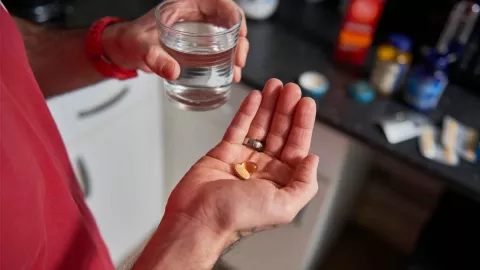
Siponimod approved for active secondary progressive MS in England, Wales and Scotland
Siponimod (Mayzent) has been approved on the NHS as the first ever oral treatment for people living with active secondary progressive MS (SPMS) in England and Wales. The drug was recommended for use in Scotland a few days ago, and we expect a decision to follow in Northern Ireland in the coming months.
This is a huge step forward in the treatment of secondary progressive MS, and our community played a big part in making this happen.
A new treatment for secondary progressive MS
Siponimod, which is taken as a daily tablet, is the first new treatment for secondary progressive MS in over a decade. The only other available treatment for active secondary progressive MS is injected, and siponimod has been shown to be more effective at reducing relapses and delaying cognitive impairment.
The drug has been found to reduce the risk of disability progression by 37% compared with a placebo (dummy drug) and could help thousands of people take control of their MS.
When siponimod was initially rejected by NICE in England and Wales in June, we asked you to tell us how the drug could make a difference to you. Thank you to everyone who shared their thoughts. Your stories really helped us to urge NICE to look again at the evidence.
Who can be prescribed siponimod?
Siponimod will be available to adults with secondary progressive MS with active disease. This means those who are experiencing relapses or have evidence of inflammation on MRI scans.
It normally takes a few months for treatments to become available on the NHS. You should speak to your doctor if you think you could benefit from siponimod.
A welcome ray of sunshine
Jacqueline, who has MS and gave evidence to the NICE Committee, said:
“I am ecstatic with the outcome. It provides a welcome ray of sunshine for people with active secondary progressive MS who previously had limited treatment options, if any.
"Knowing that it could slow down the deterioration of my walking, seeing, doing and very being allows me to make plans for the future with greater confidence.”
Get involved
Too many people affected by MS in the UK have to fight for the treatments, services, care and support they need.
Together we can change that.
Join our campaigns community and stand up for people with MS



